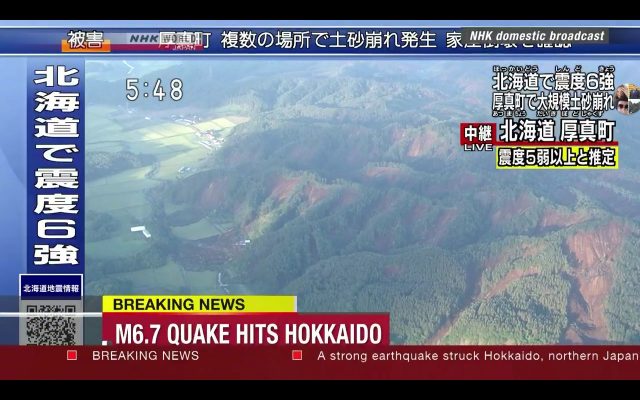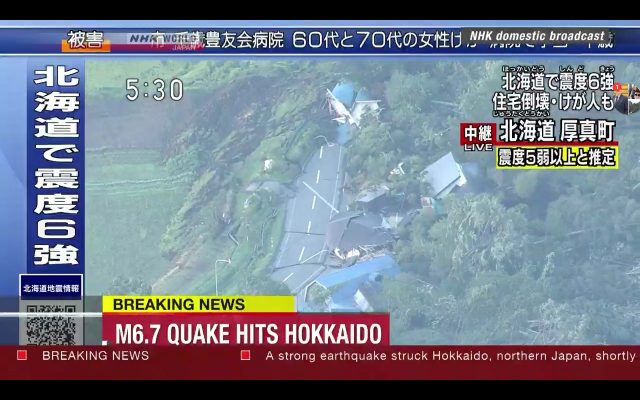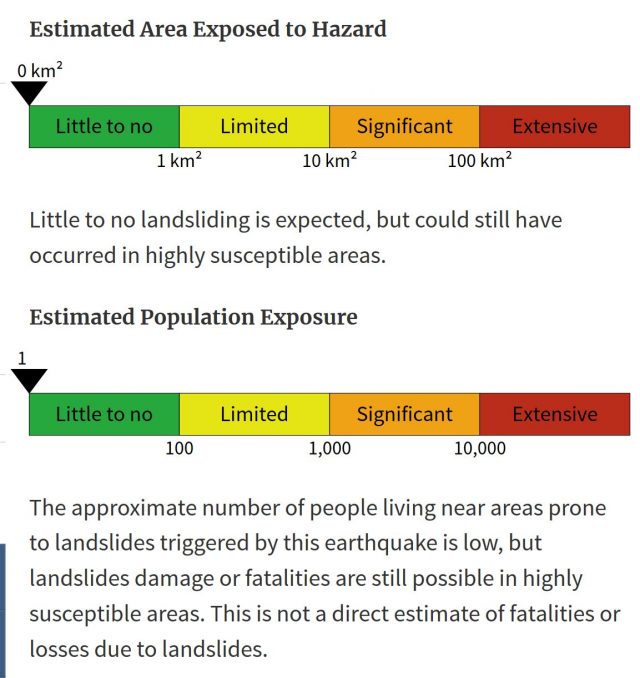5 September 2018
The Mw=6.6 earthquake in Hokkaido, Japan: early indications of significant landslides
Posted by Dave Petley
The Mw=6.6 Hokkaido earthquake in Japan: early indications of significant landslides
The Mw=6.6 earthquake in Hokkaido, Japan at 3:08 am local time today appears to have generated significant numbers of landslides. On Twitter, Jamie Gurney has captured two images from a live broadcast on the Japanese broadcaster NHK that indicate that in at least a part of the earthquake-affected area, many large landslides have been triggered:-

Landslides from the Mw=6.6 earthquake in Hokkaido, Japan. Image from a live broadcast by NHK, via Jamie Gurney.
.
These are classic co-seismic landslides, apparently being triggered at the ridge crest and then involving the entire length of the slope. Note the two landslides on the left of the image that appear to have run out a significant distance onto the flatlands. One of these appears to involve a substantially damaged building.
The image below, also from NHK via Jamie Gurney, shows another area of earthquake-induced landslides:-

Detail on one of the landslides from the Mw=6.6 earthquake in Hokkaido, Japan. Image from a live broadcast by NHK, via Jamie Gurney.
.
In this case there appears to be substantial damage to properties and a road. It seems likely that there will be casualties.
Interestingly, as Sotiris Valkaniotis has also pointed out on Twitter, the USGS Pager landslide model appears to be doing a poor job of predicting this level of landsliding. The current first pass estimate of area susceptible to landsliding is very low:-

USGS Pager estimate of landslide hazard and population exposure for the Mw=6.6 earthquake in Hokkaido, Japan. Image from USGS.
.
That is not a criticism in any way of the model – this stuff is really, really hard. There are two obvious possible explanations. The first is that the PAGER model is not describing the ground shaking well at this stage, which was the point that we made in our recent paper about the Kaikoura earthquake in New Zealand (Massey et al. 2018). The other is that the ground was saturated in the aftermath of Typhoon Jebi, and earlier rainfall events that have affected Japan this summer, leaving the ground much more susceptible to landslides. Such effects are really hard to capture.
The picture from Hokkaido will become clearer over the next few hours. Please post comments (or send me a Tweet – @davepetley) if you have any information or images.
Reference
C. Massey, D. Townsend, E. Rathje, K. E. Allstadt, B. Lukovic, Y. Kaneko, B. Bradley, J. Wartman, R. W. Jibson, D. N. Petley, N. Horspool, I. Hamling, J. Carey, S. Cox, J. Davidson, S. Dellow, J. W. Godt, C. Holden, K. Jones, A. Kaiser, M. Little, B. Lyndsell, S. McColl, R. Morgenstern, F. K. Rengers, D. Rhoades, B. Rosser, D. Strong, C. Singeisen, M. Villeneuve. 2018. Landslides Triggered by the 14 November 2016 Mw 7.8 Kaikoura Earthquake, New Zealand. Bulletin of the Seismological Society of America doi: https://doi.org/10.1785/0120170305


 Dave Petley is the Vice-Chancellor of the University of Hull in the United Kingdom. His blog provides commentary and analysis of landslide events occurring worldwide, including the landslides themselves, latest research, and conferences and meetings.
Dave Petley is the Vice-Chancellor of the University of Hull in the United Kingdom. His blog provides commentary and analysis of landslide events occurring worldwide, including the landslides themselves, latest research, and conferences and meetings.
Dramatic photos at Buzzfeed – https://www.buzzfeednews.com/article/skbaer/japan-hokkaido-earthquake-landslide-photos